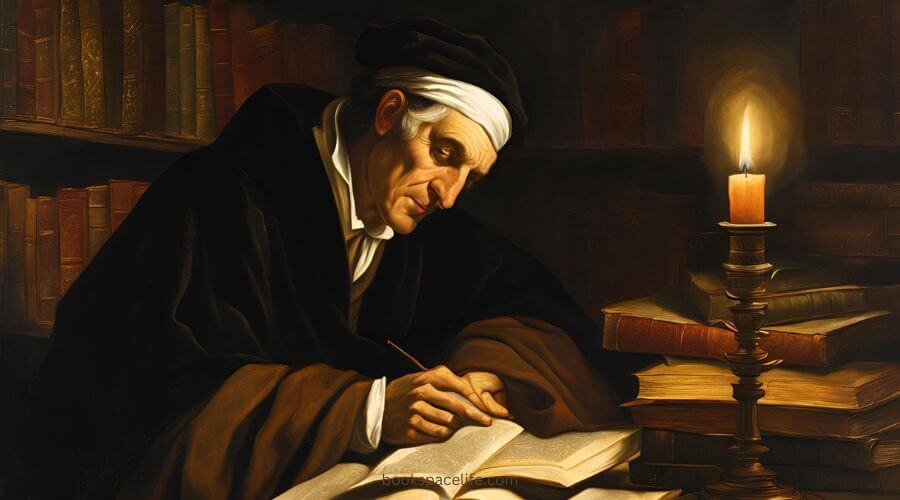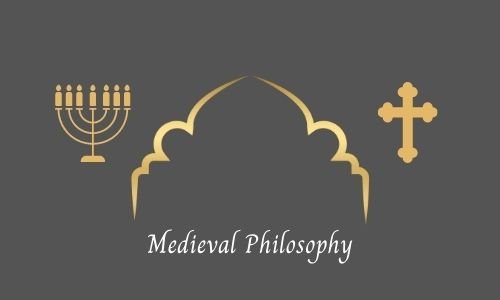Philo of Alexandria
Erasmus of Rotterdam: The Scholar Who Bridged Faith and Reason
Desiderius Erasmus of Rotterdam (1466 – 1536 CE), a Dutch Christian philosopher, theologian, and scholar, emerged as one of the most influential figures of the Northern Renaissance.
Known as the “Prince of the Humanists,” Erasmus advocated for a Christianity that was guided by reason, ethical principles, and a deep connection to scripture.
As a brilliant critic of both the Church and society, Erasmus championed reform, translating classical texts and promoting education and literacy as keys to moral improvement.
His thoughts on faith, ethics, and education left a lasting legacy, inspiring generations of theologians, scholars, and reformers.
Table of Contents
(1) Early Life and Education
Desiderius Erasmus was born in Rotterdam, the Netherlands, in 1466 (or possibly 1469), the illegitimate son of a priest, Gerard, and a physician’s daughter, Margaret.
Despite the stigma of his illegitimacy, Erasmus received a good education at a series of religious schools, including the Brethren of the Common Life in Deventer, a school known for its emphasis on piety and learning.
It was here that Erasmus was first introduced to the classical works that would shape his intellectual and spiritual life.
After his parents’ early deaths, Erasmus entered an Augustinian monastery in Steyn, where he studied theology and the works of the Church Fathers.
Although he took monastic vows, Erasmus grew dissatisfied with monastic life, longing for more academic and intellectual freedom.
In 1492, he was ordained as a priest, but his real interests lay in scholarly pursuits. He gained permission to leave the monastery to serve as the secretary to the Bishop of Cambrai, which gave him an opportunity to study more deeply.
With support from the bishop, Erasmus moved to Paris, where he attended the Collège de Montaigu at the University of Paris.
His education in Paris, where he encountered the scholastic tradition and immersed himself in classical literature, reinforced his growing desire to blend religious teachings with humanist values.
Paris, however, was only the beginning of Erasmus’s travels and intellectual pursuits.
(2) Travels and Scholarly Pursuits
Erasmus’s intellectual curiosity and desire for personal freedom led him to travel extensively throughout Europe, allowing him to connect with other leading scholars and thinkers.
He visited England, where he met notable figures such as Thomas More, John Colet, and Thomas Linacre, and found an intellectual community that shared his interest in reforming the Church through a return to biblical sources and moral principles.
In 1506, Erasmus traveled to Italy, where he furthered his classical studies in Venice, Padua, and Bologna, immersing himself in the works of Cicero, Seneca, and other classical authors.
His time in Italy also allowed him to work with Aldus Manutius, a renowned Venetian printer, which proved crucial for Erasmus’s future publishing efforts.
After Italy, Erasmus returned to England, where he took up residence at Queen’s College, Cambridge, for a time, lecturing in Greek and continuing his writings.
Erasmus’s travels not only broadened his intellectual horizons but also helped him establish a network of correspondences with scholars and humanists across Europe.
His letters, filled with insights on theology, education, and humanism, became a valuable resource for thinkers of his time and continue to be studied today.
(3) Philosophy and Key Contributions
Erasmus’s philosophy centered on Christian humanism, an intellectual movement that emphasized the importance of individual morality, education, and the application of reason within Christian teachings.
His commitment to biblical studies, moral reform, and social critique made him a major figure in the European Renaissance and an advocate for the peaceful reform of the Church.
(i) Christian Humanism
As a Christian humanist, Erasmus believed that faith and reason could coexist harmoniously. He held that education and the study of classical texts could strengthen moral and spiritual life, helping individuals understand scripture in its historical and cultural context.
Erasmus urged Christians to return to the original teachings of Christ, focusing on the moral example of Jesus rather than rigid doctrinal interpretations.
Erasmus saw the Church as having strayed from the true spirit of Christianity, burdened by wealth, corruption, and superstitions.
Through his humanist approach, he hoped to return the Church to its roots, where love, humility, and charity were the guiding principles.
For Erasmus, Christian teachings were not to be followed blindly but understood through critical thought and personal conviction.
(ii) Biblical Scholarship and Translation
One of Erasmus’s most significant contributions to Christian thought was his dedication to biblical scholarship.
He believed that Christians should read the Bible in its original languages to gain a clearer understanding of its message.
To this end, Erasmus produced a new Latin translation of the New Testament in 1516, accompanied by a critical edition of the Greek text.
His translation, known as the Novum Instrumentum, challenged the traditional Latin Vulgate and offered a more accurate rendering of the New Testament based on the earliest manuscripts available.
Erasmus’s translation sparked controversy and was viewed by some as a threat to the authority of the Church, which relied on the Vulgate.
Nevertheless, his work influenced many later reformers, including Martin Luther, who used Erasmus’s Greek New Testament for his own translation into German.
Erasmus’s emphasis on returning to the sources (ad fontes) became a central tenet of humanist thought, encouraging critical examination of the scriptures and a more direct engagement with the text.
(iii) The Praise of Folly
Erasmus’s satirical work, In Praise of Folly (Moriae Encomium), published in 1511, is one of his best-known writings and an enduring classic of Renaissance literature.
Dedicated to his friend Thomas More, this work humorously critiques the abuses and absurdities of society, the Church, and the clergy.
Through the character of Folly, Erasmus exposes the hypocrisy, corruption, and ignorance that he believed plagued both religious and secular institutions.
In Praise of Folly was widely popular and helped make Erasmus one of the most recognizable figures of his time.
His satire underscored his belief that reason and moral reform were essential to Christianity, and his sharp wit exposed the flaws he saw in the world around him.
While he criticized church officials, his critique was intended not to destroy but to inspire reform within the Church.
(iv) Influence on the Reformation and Relationship with Martin Luther
Erasmus’s advocacy for reform and return to biblical sources significantly influenced the Protestant Reformation, even though he himself remained loyal to the Catholic Church and disagreed with the more radical changes advocated by reformers like Martin Luther.
Erasmus’s writings encouraged a spirit of questioning and critical thinking, which inspired reformers to challenge church authorities and practices that they saw as corrupt or unfaithful to scripture.
His relationship with Martin Luther is a fascinating and complex aspect of his legacy. Initially, Luther respected Erasmus’s scholarship, and Erasmus sympathized with some of Luther’s criticisms of church practices.
However, as Luther’s movement grew more radical and challenged core Catholic doctrines, Erasmus distanced himself.
In 1524, he published On the Freedom of the Will, where he argued against Luther’s doctrine of predestination and asserted that humans have free will in choosing to follow God.
Erasmus believed in a moderate approach to reform and feared that Luther’s radical methods would lead to division and violence.
Despite their differences, Erasmus’s work provided a foundation for the intellectual currents that fueled the Reformation, and he remains a respected figure among both Catholics and Protestants.
(4) Legacy and Enduring Impact
Erasmus’s contributions to education, biblical scholarship, and Christian ethics had a lasting impact on European thought.
As one of the leading proponents of humanist education, he believed that learning and literacy could transform society.
His influence on education extended beyond theology; he inspired the development of a humanist curriculum that included classical texts, rhetoric, and philosophy.
In the realm of biblical scholarship, Erasmus’s Novum Instrumentum paved the way for future translations of the Bible, shaping the way scripture was read and understood by both clergy and laypeople.
His advocacy for critical thinking and questioning of established doctrines inspired generations of theologians, philosophers, and reformers.
Erasmus’s approach to faith as a matter of reasoned conviction, rather than blind adherence, encouraged a more thoughtful and personal approach to Christianity.
Erasmus’s legacy as the “Prince of the Humanists” continues to be celebrated for its advocacy of peaceful reform and intellectual freedom.
His life and works represent a bridge between the medieval and modern worlds, emphasizing that religious belief and scholarly inquiry could coexist.
(5) Conclusion: Erasmus’s Enduring Relevance
Erasmus of Rotterdam remains a pivotal figure in the history of Western thought and Christianity.
His efforts to combine faith and reason, critique the Church’s failings without abandoning it, and promote a more personal and ethically grounded Christianity resonate with contemporary discussions on faith and social responsibility.
His legacy reminds us of the power of scholarship and satire in promoting change, and his philosophy encourages a vision of religion grounded in love, humility, and moral integrity.
In an age of polarized religious debates, Erasmus’s life offers a model of intellectual and spiritual moderation.
His call for reform without division, his dedication to learning, and his belief in the transformative power of scripture continue to inspire those who seek to navigate the complexities of faith, reason, and social justice.
Erasmus’s legacy endures as a reminder of the enduring relevance of humanist principles and the transformative potential of a faith guided by reason and compassion.








